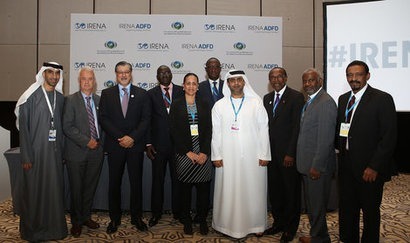
The loans will fund a wind and solar project in Antigua and Barbuda, a solar project in Burkina Faso, a solar and wind project in Cabo Verde and a solar project in Senegal. This amounts to nearly 12 MW of new renewable energy capacity, reducing emissions, creating jobs and electrifying rural communities.
The 4 MW wind and solar project in Antigua and Barbuda will receive $15 million to provide energy for water desalination and increased climate resilience, displacing 8,275 tonnes of carbon dioxide per year. The 3.6 MW solar PV mini-grid project in Burkina Faso will receive $10 million to provide modern energy services to more than 12,000 local families, displacing 2,500 tonnes of CO2 per year. In Cabo Verde, the 2 MW hybrid grid-connected solar PV and wind project will receive $8 million to provide a 100 percent renewable energy solution for the Island of Brava, displacing g 4,665 tonnes of CO2 per year. Finally, in Senegal, a 2 MW solar PV mini-grid project will receive $13 million to supply electricity to rural villages, displacing 3,200 tonnes of CO2 per year.
“Accelerating the energy transition to renewables requires all countries to take action to develop their own local renewable energy sources” said IRENA Director-General Adnan Z. Amin speaking at a press conference during IRENA’s sixth Assembly. “While renewable energy resources are abundant in many developing countries, adequate finance can still be a barrier to deployment. IRENA and ADFD’s pioneering partnership contributes to overcoming this challenge, by selecting innovative projects for concessional funding.”
Mohammed Saif Al Suwaidi, Director General of ADFD, added that increased availability of clean, affordable and reliable energy is an important priority for the fund to drive sustainable development and positive societal changes across developing countries. ADFD’s collaboration with IRENA has significantly contributed to narrowing the energy divide that has hindered development projects in developing countries due to the lack of reliable power infrastructure. Through this collaboration, the fund has ensured the availability of necessary financial resources to move the sustainable development agenda forward.
All the projects are innovative, potentially replicable or scalable and will improve energy access. Funding has been provided through the IRENA/ADFD Project Facility which commits $350 million to increase the deployment of renewable energy in developing countries. To date, the facility has allocated $144 million in project over its first three cycles. Loans finance up to 50 percent of each project, attracting co-financing from banks, international financial institutions and other development partners. This mobilises enough funds to more than double the original investment and helps build local financial markets to create valuable know-how for the future.
For additional information:

